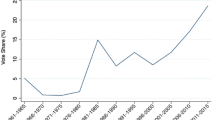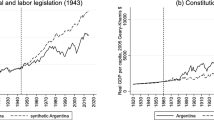Abstract
In contrast to prevailing claims of neoliberal hegemony, this article argues that French and German trajectories of adjustment have diverged from standard neoliberal recipes in important ways. France has accompanied liberalization with macroeconomically oriented measures designed to bolster aggregate demand, while Germany has imposed the burden of reform on outsiders while shielding insiders from the costs of adjustment. This article argues that differences in French and German policy trajectories are informed by distinctive national liberalisms—‘statist liberalism’ in the French case and ‘corporate liberalism’ in Germany—that entail divergent models of state intervention, social organization, and political accountability, while rejecting standard neoliberal prescriptions. It develops these claims through an analysis of French and German labour-market reforms in the 1990s and 2000s and policy responses to the post-2007 crisis. It argues that a focus on the political power of ideas is crucial for understanding broad national adjustment strategies across institutional, policy, and partisan contexts.
Similar content being viewed by others
Notes
Cerny (2016: 83–84) argues that the historical reliance of capitalist markets on state intervention shows that ‘the conditions for market efficiency do not arise spontaneously from human (or social) interaction’.
In this respect, Gamble builds upon Polanyi’s (1957) conception of the ‘double movement’, whereby the deployment of the state as an instrument of market creation generates societal pressures for the state to buffer society from market vagaries.
I derive this term from the Latin corpus, or ‘body’. Contemporary references to ‘Ordoliberal’ Germany fail to capture the evolution of German economic thinking since the 1950s or the emphasis on groups that predated its emergence.
My use of ‘mesoeconomics’ echoes earlier work on the concept, notably Holland (1987).
Here and throughout, I use the term ‘Keynesian’ to describe measures designed to sustain demand and foster economic growth, whether in the form of discretionary spending or automatic stabilizers. I do not intend to suggest that elites were willing to fund such efforts through heavily counter-cyclical deficit spending.
In the case of labour, this distrust was codified in the Le Chapelier Law of 1791, which banned guilds. It also echoed and was reinforced by Revolutionaries’ anti-clericalism, which stemmed from the Catholic Church’s connection to the ancien régime.
This tension between unions as organizations and workers as beneficiaries would find echoes in the German case, though according to a very different logic, as I describe below.
Such income-support programs had been consistently expanded during the 1980s and 1990s, resulting in an increase in aggregate social spending from 25.2% of GDP in 1985 (after President Mitterrand’s abandonment of dirigisme) to 28.7% in 2005 (OECD 2017).
This hesitation stemmed from conflict between the Labour Ministry, which favoured a robust response, and the Finance Ministry, which wanted to rely on existing automatic stabilizers (interview, official, Bundesministerium für Arbeit und Soziales, Berlin, 20 July 2015).
References
Agence France Presse. 2008. Crise économique: Sarkozy content d’avoir fait les ‘bons choix’, 23 January.
Baccaro, L., and C. Howell. 2017. Trajectories of neoliberal transformation: European industrial relations since the 1970s. Cambridge: Cambridge University Press.
Berliner Morgenpost. 2009. Regierung beschließt Rekordverschuldung: 50 Milliarden Euro für Konjunkturpaket II. 28 January.
Blyth, M. 2002. Great transformations: Economic ideas and institutional change in the twentieth century. Cambridge: Cambridge University Press.
Blyth, M. 2013. Austerity: The history of a dangerous idea. New York: Oxford University Press.
Boyes, R. 2010. Merkel faces budget trouble over £66bn ‘list of horrors’. The Times, 8 June.
Cahill, D., and M. Konings. 2017. Neoliberalism. Cambridge: Polity.
Carnegy, H. 2013. France misses 2012 deficit target. Financial Times, 29 March.
Carnegy, H. 2014. Hollande signals intent to push through reforms. Financial Times, 26 August.
Cerny, P.G. 2016. In the shadow of ordoliberalism: The paradox of neoliberalism in the 21st century. European Review of International Studies 3(1): 78–91.
Chassany, A. 2017. Emmanuel Macron proposes Nordic-style economic model for France. Financial Times, 23 February 2017.
Cowell, A. and Kulish, N. 2012. Austerity faces sharper debate after European elections. New York Times, 7 May.
Davies, W. 2017. The limits of neoliberalism. London: Sage.
De Montalembert, M. (ed.). 2004. La protection sociale en France, 4th ed. Paris: La documentation française.
Der Tagesspiegel. 2009. Industrie klagt über Kosten der Kurzarbeit. 22 July.
Economist. 2009. Vive la différence, 9–15 May, p. 28.
Economist online. 2010. Slash and bounce, 12–18 June.
Finlayson, A. 2004. The interpretive approach in political science: A symposium—Introduction. British Journal of Politics and International Relations 6(2): 129–164.
Gamble, A. 1994 [1988]. The free economy and the strong state: The politics of Thatcherism. Houndsmills: Macmillan.
Hall, P.A., and D. Soskice (eds.). 2001. Varieties of capitalism: The institutional foundations of comparative advantage. Oxford: Oxford University Press.
Harvey, D. 2005. A brief history of neoliberalism. Oxford: Oxford University Press.
Hay, C. 2016. Social constructivism. In The Routledge handbook of interpretive political science, ed. M. Bevir and R.A.W. Rhodes, 99–112. London: Routledge.
Holland, S. 1987. The market economy: From micro to mesoeconomics. New York: St. Martin’s.
ILO. 2010. World social security report: Providing coverage in times of crisis and beyond. Geneva: ILO.
Jabko, N. 2006. Playing the market : A political strategy for uniting Europe, 1985–2005. Ithaca: Cornell University Press.
Jaume, L. 2017. Un libéralisme de rupture. Le Monde, 14 May: p. 24.
Jha, V. 2009. The effects of fiscal stimulus packages on employment. ILO Working Paper no. 34. Washington: ILO.
Leifels, A., S. Moog, and B. Raffelhüschen. 2009. Auswirkungen der Konjunkturpakete auf öffentlichen Haushalte in 2009 und 2010. Albert-Ludwigs-Universität Freiburg Working Paper, March.
Meichtry, S. 2015. Germany risks balanced-budget ‘fetishism’, French Minister Says. Wall Street Journal, 29 January.
OECD. 2009. OECD economic outlook, interim report. Paris: OECD.
OECD. 2010. OECD employment outlook, 2010. Paris: OECD.
OECD. 2014. Main Economic Indicators Database. https://doi.org/10.1787/data-00052-en.
OECD (2017) Social Expenditure, Aggregated Data Database, https://doi.org/10.1787/socx- data-en, accessed 31 July 2017.
Parsons, C. 2003. A certain idea of Europe. Ithaca: Cornell University Press.
Peck, J. 2010. Constructions of neoliberal reason. Oxford: Oxford University Press.
Polanyi, K. 1957 [1944]. The great transformation: The political and economic origins of our time. Boston: Beacon.
Prasad, E. and I. Sorkin. 2009. Assessing the G-20 stimulus plans: A deeper look. Brookings Institution Working Paper, 14 December. Washington: Brookings.
Rodrik, D. 2011. The globalization paradox: Democracy and the future of the world economy. New York: W.W. Norton.
Schwengler, B., and V. Loibl. 2010. Aufschwung und Krise wirken regional unterschiedlich, IAB Kurzbericht No. 1. Nürnberg: IAB.
Shonfield, A. 1965. Modern capitalism: The changing balance of public and private power. Oxford: Oxford University Press.
Stein, A. 2016. The great trilemma: Are globalization, democracy, and sovereignty compatible? International Theory 8(2): 297–340.
Thatcher, M., and V. Schmidt (eds.). 2013. Resilient liberalism in Europe’s political economy. Cambridge: Cambridge University Press.
Thelen, K. 2014. Varieties of liberalization and the new politics of social solidarity. Cambridge: Cambridge University Press.
Vail, M.I. 2010. Recasting welfare capitalism: Economic adjustment in contemporary France and Germany. Philadelphia: Temple University Press.
Vail, M.I. 2018. Liberalism in illiberal states: Ideas and economic adjustment in contemporary Europe. New York: Oxford University Press.
Vogel, S.K. 2018. Marketcraft: How governments make markets work. New York: Oxford University Press.
World Bank. 2014. World Development Indicators Database. http://databank.worldbank.org/data/views/reports/tableview.aspx.
Acknowledgements
The author wishes to thank Robert Adcock, Mark Blyth, Robert Fannion, Wade Jacoby, Naomi Levy, Tobias Schulze-Cleven, and the participants at the “Future of Work” Conference at Rutgers University in March 2016 for helpful comments on portions of this article; the Center for Advanced Study in the Behavioral Sciences at Stanford for institutional support during a sabbatical during which portions of this material were conceptualized; and two anonymous reviewers at Comparative European Politics for helpful comments on earlier versions of this article.
Author information
Authors and Affiliations
Corresponding author
Additional information
Publisher's Note
Springer Nature remains neutral with regard to jurisdictional claims in published maps and institutional affiliations.
Rights and permissions
About this article
Cite this article
Vail, M.I. National liberalisms in a neoliberal age: ideas and economic adjustment in contemporary France and Germany. Comp Eur Polit 18, 109–127 (2020). https://doi.org/10.1057/s41295-019-00155-8
Published:
Issue Date:
DOI: https://doi.org/10.1057/s41295-019-00155-8




